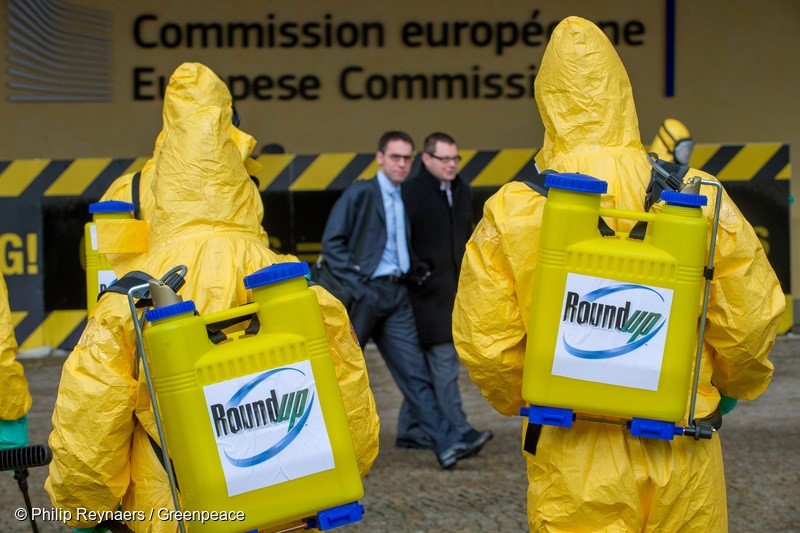Brussels/Strasbourg – MEPs have backed restrictions on the use of glyphosate – the world’s most used weedkiller – and a shortening of its licence, amid rising health concerns.
Protest action at European Commission buildings in Brussels against glyphosate, the main component of world most widely used herbicide Roundup.
In a non-binding resolution, the European Parliament called for a ban on all uses of glyphosate-based herbicides in private and public green areas, including spraying in and around public parks, playgrounds and gardens. MEPs also called for restrictions on use in agricultural fields shortly before harvesting, and said a new glyphosate licence should be limited to seven instead of 15 years.
The Parliament also called for full disclosure of the scientific evidence behind an assessment of glyphosate by the European Food Safety Authority (EFSA). Environmental and transparency organisations have called for the full publication of this evidence, and criticised glyphosate producers for their reluctance to publish carcinogenicity studies evaluated by EFSA.
Greenpeace EU food policy director Franziska Achterberg said: “MEPs are right to call for tough restrictions of glyphosate use, but these are not sufficient to protect people and the environment. The science shows that glyphosate is a threat for public health and must be banned outright. A ban in cities and gardens would not prevent large-scale contamination of food, water, soil and air.”
A study by Germany’s Federal Research Centre for Cultivated Plants shows that farmers can do without glyphosate, without needing to replace the herbicide with other toxic chemicals.
In March 2015, the WHO’s International Agency for Research on Cancer classified glyphosate as a probable carcinogen. However, the EFSA said in November 2015 that there was no evidence of a cancer link. Under EU law, a classification as a presumed carcinogen would result in an automatic ban.
The EU licence for glyphosate runs out at the end of June 2016, although an assessment of the weedkiller by the European Chemicals Agency will not be completed before the end of 2017.
In March 2016, the Commission was unable to muster enough support among EU member state representatives to extend the lease of glyphosate.
Contact:
Franziska Achterberg – Greenpeace EU food policy director: +32 (0)498 362403, [email protected]
Greenpeace EU press desk: [email protected], +32 (0) 274 19 11
For breaking news and comment on EU affairs: www.twitter.com/GreenpeaceEU
Greenpeace is an independent global campaigning organisation that acts to change attitudes and behaviour, to protect and conserve the environment and to promote peace. Greenpeace does not accept donations from governments, the EU, businesses or political parties.

